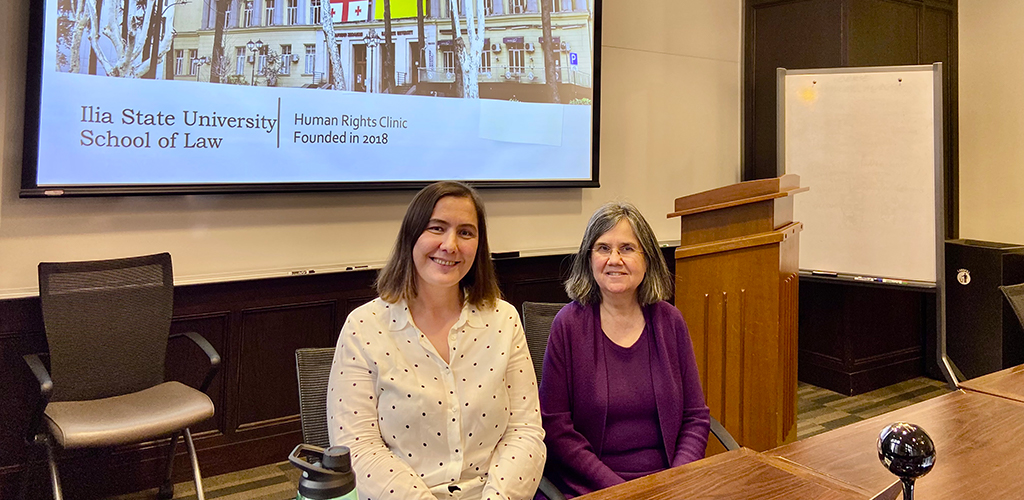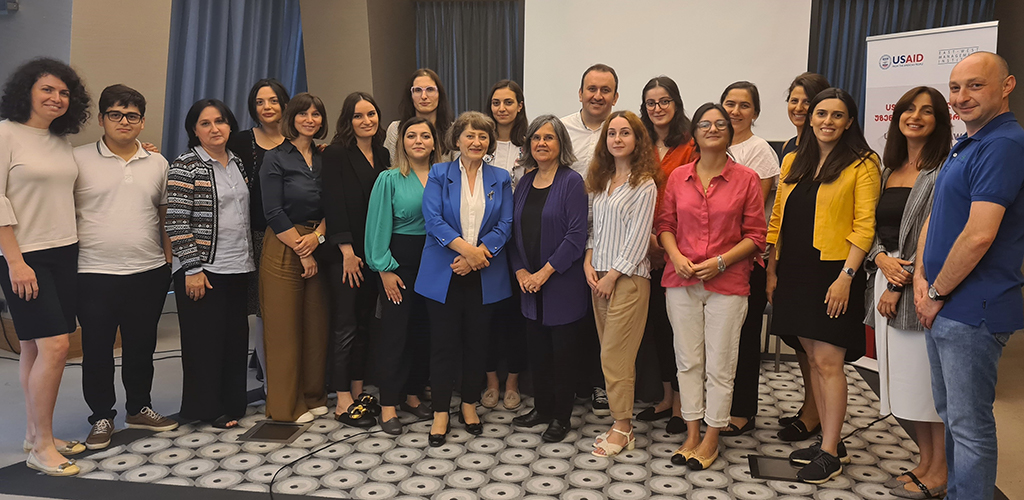A Northwestern Perspective: Tax Law
At Northwestern Pritzker School of Law, distinguished faculty members are at the vanguard of tax law scholarship, dedicating their careers to advancing the field through rigorous research and ...
09.13.2022
Scholarship Bluhm Legal Clinic Faculty
Bridget Arimond, clinical professor of law and director of the LLM Program in International Human Rights, has received a new grant from the East West Management Institute to continue Northwestern Pritzker School of Law’s work in Tbilisi, Georgia and outlying cities.
The new grant will not only expand the work that the Law School has already done—which includes extensive support for a human rights legal clinic at a law school in the capital city of Tbilisi—but also shift focus to include strengthening clinical legal education in regional law schools throughout Georgia. The new program, “USAID Rule of Law Program in Georgia,” began earlier this year and will run until 2026. Northwestern Pritzker Law received this grant as a sub-awardee of East West Management Institute (EWMI), which was selected by the U.S. Agency for International Development (USAID) to implement the overall project.
Northwestern Pritzker Law first collaborated with EWMI under USAID’s predecessor program, “Promoting Rule of Law in Georgia (PROLoG),” which ran from 2015-2021. During that time, Arimond brought in fellow Northwestern Pritzker Law professors Andrew Koppelman, John Paul Stevens Professor of Law, and Jason DeSanto, senior lecturer, to join her in the work in Georgia. All three taught classes at the Constitutional Court of Georgia’s summer school on human rights and constitutional law, and Arimond designed and taught several workshops teaching law faculty and students the intricacies of law clinic work. Through her work with PROLoG, Arimond connected with Tamar Gurchiani, founding director of the Ilia State University School of Law Human Rights Clinic in Tbilisi, Georgia. Arimond, along with Bluhm Legal Clinic Executive Director Shericka Pringle, provided advice and guidance to the Ilia State Law dean and faculty during the clinic’s planning phase, and Arimond has provided ongoing mentoring and support to the clinic faculty and students since the clinic’s 2018 launch.
Arimond says Gurchiani’s passion and advocacy for her clinic is what elevated their professional partnership. “Tamar has been a shining star,” Arimond says. The launch of a successful clinic is no easy feat, she notes, and says she knew the pair would work well together after their first meeting. “When I had the meeting with Tamar, we just hit it off,” Arimond says. “We went out to dinner and that was the start of a really important friendship.”
Gurchiani shared the sentiment. “[Northwestern’s] financial support wasn’t as important as the intellectual support. The support to our ideas,” she says. “Our ideas seem really extreme to certain people in Georgia.” Gurchiani highlights how dangerous her clinic’s work with LGBTQ and gender rights can be. “But PROLOG’s support, the name of Northwestern University in general, brought the confidence that we needed, the legitimacy that we needed, and that expertise was crucial for us.”

Arimond says the work of the Ilia State clinic could be a model going forward for law clinics at other Georgian law schools. “What’s going on at Ilia is viewed as having a really strong prospect of sustainability after the project,” she says. “It has not only sustained, it has thrived.”
During the final months of PROLoG, Arimond established a new partnership with law school administrators and faculty at Zugdidi University in the far west of Georgia, supporting their development of a new law clinic. The new grant will allow her to continue and deepen her support for that clinic, and to begin partnerships with law clinics elsewhere in Georgia.
Clinical legal education serves both pedagogical and social justice goals, Arimond noted. Law clinics expand access to justice for vulnerable populations that would otherwise go unrepresented. At the same time, clinical education teaches students the practical skills of becoming a lawyer, which they may not acquire in a typical classroom. “How do you conduct an effective interview? How do you establish rapport with your client? How do you assess a case and come up with a theory?” Arimond asks. Being a lawyer, she says, is more than what you read in a textbook. “You may think you understand the legal rules or the legal principles that are involved, but when you actually try to apply them, you really get deeper into what you are talking about.”
Arimond is excited that the new grant will allow her not only to continue her work with the Ilia State clinic, but to expand her collaboration on clinical legal education elsewhere in Georgia. This past July, she returned to Georgia for two weeks to work with the law clinic at Ilia State University and to participate in a conference on clinical legal education held in Batumi for law faculty from schools throughout Georgia. “A lot of clinical legal education in the U.S. dates back to the early ‘70s. What was new back then in the U.S. is now completely accepted as an essential component of legal education,” she says. “I believe clinical legal education will improve the training of lawyers and will improve access to justice in Georgia. It’s been a real pleasure for me to take some of what we learned [in the U.S.] and offer it to them. Always keeping in mind that they get to decide what works in their system.”
At Northwestern Pritzker School of Law, distinguished faculty members are at the vanguard of tax law scholarship, dedicating their careers to advancing the field through rigorous research and ...
The research and teaching of criminal law scholars at Northwestern University Pritzker School of Law covers a wide range of academic disciplines, from social psychology to economics, along with ...
Northwestern Pritzker School of Law is home to an incredible group of faculty members working at the intersections of law and many other disciplines. Their research and scholarship has helped ...